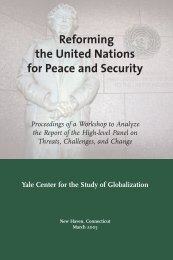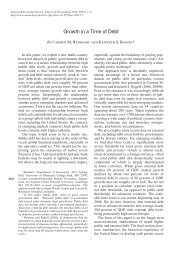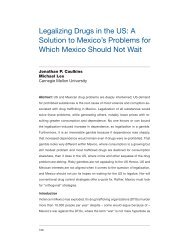The collapse of global trade, murky protectionism, and the crisis:
The collapse of global trade, murky protectionism, and the crisis:
The collapse of global trade, murky protectionism, and the crisis:
Create successful ePaper yourself
Turn your PDF publications into a flip-book with our unique Google optimized e-Paper software.
VOX<br />
Research-based policy analysis <strong>and</strong> commentary from leading economists<br />
countries B to Z! This is more so today when <strong>the</strong> world is even more inter-connected<br />
through <strong>the</strong> <strong>global</strong> supply chain. In an excellent paper published by <strong>the</strong> Peterson<br />
Institute for International Economics (Buy American: Bad for Jobs, Worse for Reputation,<br />
February 2009), authors Gary Hufbauer <strong>and</strong> Jeffrey Schott estimate <strong>the</strong> possible gain<br />
<strong>of</strong> 1000 jobs in <strong>the</strong> US steel industry arising from <strong>the</strong> Buy American Act could result<br />
in <strong>the</strong> loss <strong>of</strong> 65,000 jobs due to fall in exports arising from retaliation. That is <strong>the</strong><br />
true "logic" <strong>of</strong> <strong>protectionism</strong>.<br />
Trade, innovation, national economic reforms, competitive corporate strategies<br />
<strong>and</strong> capital flows, especially in <strong>the</strong> form <strong>of</strong> FDI (foreign direct investment) cause<br />
change in <strong>the</strong> employment l<strong>and</strong>scape <strong>of</strong> nations <strong>and</strong> <strong>the</strong> <strong>global</strong> market economy in<br />
ways that are dynamic <strong>and</strong> constructive. Just one among countless examples: policy<br />
reforms in Vietnam <strong>and</strong> <strong>the</strong> opening <strong>of</strong> <strong>the</strong> country to FDI have resulted in Vietnam<br />
going from nowhere on <strong>the</strong> <strong>global</strong> economic map to becoming, among o<strong>the</strong>r things,<br />
one <strong>of</strong> <strong>the</strong> world's biggest producers <strong>of</strong> shoes. <strong>The</strong> production <strong>of</strong> shoes <strong>and</strong> <strong>the</strong><br />
employment it has generated have contributed to Vietnam's remarkable record in<br />
poverty reduction, which in turn has transformed millions <strong>of</strong> Vietnamese into consumers<br />
<strong>of</strong> <strong>global</strong> goods <strong>and</strong> services. Thus, while Vietnam's emergence as <strong>global</strong> shoe<br />
producer may have resulted in <strong>the</strong> loss <strong>of</strong> jobs in certain countries, e.g. Italy, overall<br />
it has created more jobs <strong>and</strong> also contributed to more wealth which will allow<br />
Vietnamese to consume Italian <strong>and</strong> o<strong>the</strong>r counties' products. When Gordon Brown<br />
stated that <strong>global</strong> challenges require <strong>global</strong> solutions, he was correct. This is also true<br />
<strong>of</strong> <strong>global</strong> firms. If all firms try to preserve jobs everywhere, including in <strong>the</strong>ir own<br />
domestic markets, ultimately <strong>the</strong> <strong>global</strong> labour market will be reduced, ra<strong>the</strong>r than<br />
increased.<br />
Unquestionably, companies <strong>and</strong> economies can enhance <strong>the</strong>ir competitiveness by<br />
<strong>the</strong>ir ability to create jobs on a sustained basis. <strong>The</strong> movement <strong>of</strong> people, goods,<br />
money, <strong>and</strong> information has shaped an interdependent world <strong>and</strong> we cannot afford<br />
to simply protect jobs <strong>and</strong> leave new job creation to chance. Jobs can be created by<br />
focusing on <strong>the</strong> right industries, providing incentives for research to drive <strong>the</strong> development<br />
<strong>and</strong> growth <strong>of</strong> those industries <strong>and</strong> implementing plans that support <strong>the</strong><br />
upgrading <strong>of</strong> skills. Industry, universities, vocational institutes <strong>and</strong> government must<br />
work toge<strong>the</strong>r in this critical endeavour to ensure we seize all opportunities <strong>and</strong> avoid<br />
<strong>the</strong> trap <strong>of</strong> <strong>protectionism</strong>.<br />
In looking at <strong>the</strong> <strong>global</strong> economic l<strong>and</strong>scape today, while recognising <strong>the</strong> severity<br />
<strong>of</strong> <strong>the</strong> <strong>crisis</strong>, it is also more than legitimate to celebrate <strong>the</strong> fact that <strong>the</strong> last twenty<br />
years <strong>of</strong> <strong>the</strong> <strong>global</strong> market economy have witnessed phenomenal growth among<br />
many developing economies <strong>and</strong> unprecedented reductions in poverty. Without a<br />
single exception, all <strong>of</strong> <strong>the</strong> high growth developing economies have been ones that<br />
have embraced <strong>the</strong> <strong>global</strong> market economy. This is now at risk. <strong>The</strong> perils <strong>of</strong> <strong>protectionism</strong><br />
must be actively combated.<br />
<strong>The</strong> <strong>crisis</strong> <strong>of</strong> confidence<br />
We must also address <strong>the</strong> <strong>crisis</strong> <strong>of</strong> confidence which is coupled with a strong sense <strong>of</strong><br />
insecurity. This is true across <strong>the</strong> world, whe<strong>the</strong>r among <strong>the</strong> millions <strong>of</strong> Chinese<br />
migrant workers who fear for <strong>the</strong>ir livelihoods or among American workers who fear<br />
losing <strong>the</strong>ir jobs <strong>and</strong> hence <strong>the</strong>ir health insurance. In rejecting <strong>protectionism</strong>, we<br />
must at <strong>the</strong> same time recognise that if confidence is to be restored, while it is wrong<br />
to try to protect jobs through <strong>protectionism</strong>, people do need to be protected. This<br />
26





